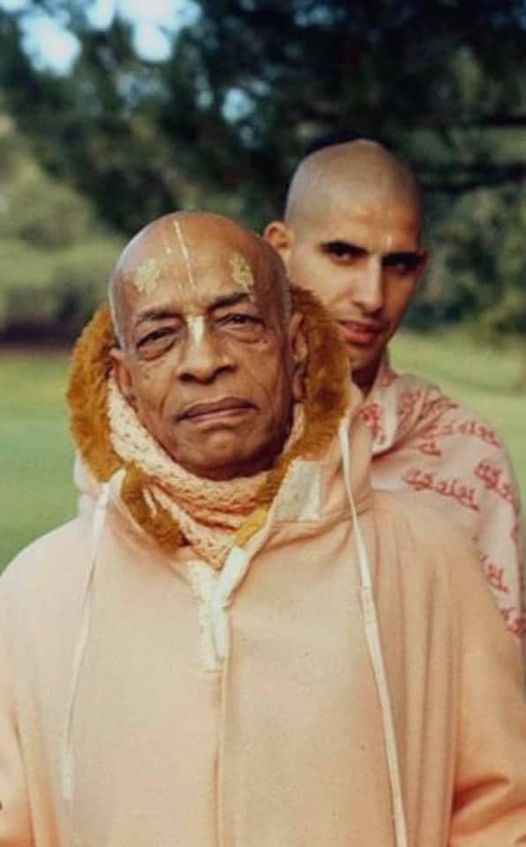June 17, 1976 : Toronto
Hari Sauri: For his walk, Visvakarma Prabhu took Srila Prabhupada to the Rouge Park System, Don Mills, just outside Toronto. Even though it is mid-June, until the sun comes up the temperature is quite chilly, so as he walked and talked, Prabhupada kept his folded cadar draped over his head.

Subhavilasa asked Srila Prabhupada why there is so much poverty in India, when it is the land where Krishna appeared. He said that this question regularly came up with Indians. Srila Prabhupada told him that India is indeed the land of God, but the people of India are not following God’s instructions.
He gave the example of the police. If a policeman is found guilty of stealing, he is punished more severely than an ordinary thief. He said the people of India are building factories rather than following Brahminical culture, and therefore they have to suffer. “This ugra-karma of industry is for demons. This is not for brahmanas and kshatriyas. Brahmana, kshatriya, when they started to work as demons, as ugra-karma, then will they not be punished? Definitely they will be punished.”
He made the point that although Lord Chaitanya instructed those who are born in Bharata-varsa to make their lives perfect and then teach others, the Indians are not coming to the West to teach, they are coming here to learn from the mlecchas. He said on an airplane he personally saw a Madwari man eating the intestines of a hog. “In big, big Madwari’s house this is what happens. Why? Because of bad habits. Bharata is a pious land but they started oil refinery. At present they will not give sanction to build a temple. This is the government.”
Subhavilasa asked him how there would be any improvement. Srila Prabhupada shook his head. “Improvement will be there when they die. This is all reactions of sinful activities. Human life is meant for tapasya, not for oil refinery.”
Reference: A Transcendental Diary Volume 2 – Hari Sauri Dasa
Shared by Rasananda Dasa on Facebook on 06/17/2024
Glossary
1. Srila Prabhupada
- Description: Founder of the International Society for Krishna Consciousness (ISKCON) and one of the most influential spiritual leaders of the Hare Krishna movement.
- Context: Central figure in the narrative, answering questions about the situation in India.
2. Rouge Park System
- Description: A large natural park located on the outskirts of Toronto, Canada.
- Context: The place where Srila Prabhupada was taken for a walk.
3. Cadar
- Description: A shawl or wrap worn over the shoulders or head, commonly used by spiritual leaders in India.
- Context: Srila Prabhupada kept his folded cadar over his head during the walk because of the cold.
4. Brahminical
- Description: Related to the Brahmins, the priestly caste in India, responsible for maintaining and teaching religious and cultural traditions.
- Context: Srila Prabhupada laments that Indians are building factories instead of following Brahminical culture.
5. Ugra-karma
- Description: Sanskrit term meaning “violent or destructive work,” often associated with industrial activities that degrade the environment and morals.
- Context: Srila Prabhupada criticizes industrialization in India, considering it a form of ugra-karma.
6. Bharata-varsa
- Description: Ancient name for India, considered a sacred place in Vedic tradition.
- Context: Srila Prabhupada mentions that those born in Bharata-varsa should perfect their lives and then teach others.
7. Mlecchas
- Description: Vedic term for people who do not follow Vedic cultural and religious norms, often referred to as foreigners or barbarians.
- Context: Srila Prabhupada laments that Indians are learning from the mlecchas instead of teaching them.
8. Tapasya
- Description: Practice of austerity and spiritual discipline for purification and spiritual elevation.
- Context: Srila Prabhupada emphasizes that human life should be dedicated to tapasya, not to industrial activities.
9. Hari Sauri Dasa
- Description: Disciple of Srila Prabhupada and author of the diary documenting Prabhupada’s teachings and activities.
- Context: Narrator of the event described in the text.
